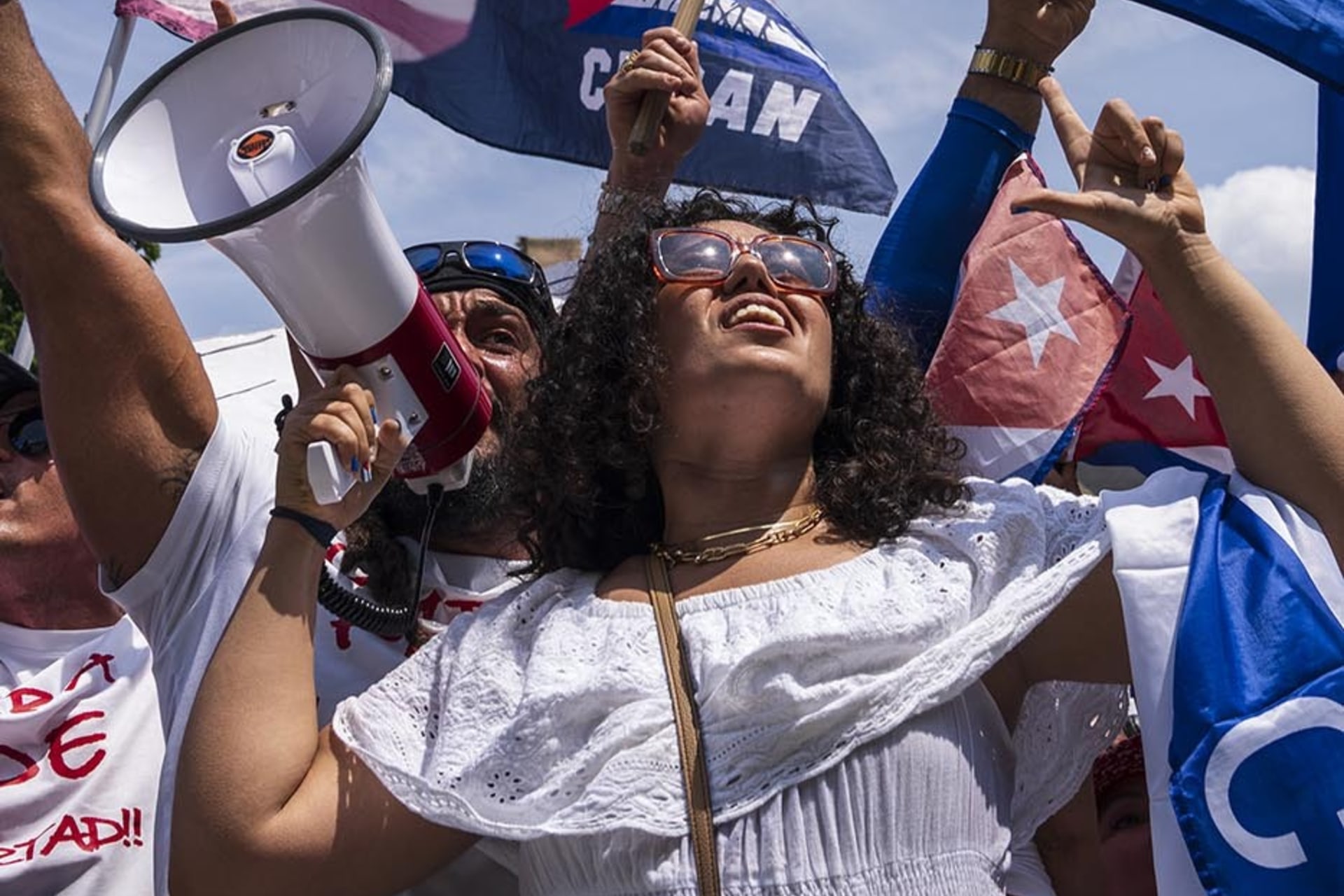Somalia’s Transitional Government
Published
Updated
Though international observers had hoped Somalia’s transitional federal government would bring stability to the war-torn nation after sixteen years of “failed state” status, by mid-2008 experts said it was fraught by internal divisions.
This publication is now archived.
Introduction
On January 8, 2007, Somali President Abdullahi Yusuf Ahmed set foot in the capital city of Mogadishu for the first time since taking office in 2004. His arrival symbolized a victory by Somalia’s Transitional Federal Government (TFG) over the Islamic Courts, a group of fundamentalist Islamic militias that had grown so powerful over the preceding year that they briefly controlled much of the country’s territory. Though international observers had hoped the TFG would bring stability to the war-torn nation after sixteen years of “failed state” status, by mid-2008 experts said the TFG was fraught by internal divisions. Meanwhile, the Islamists have made a strong comeback, with an increasingly radicalized extremist movement holding sway over more moderate factions of the Courts.
What is the Transitional Federal Government (TFG)?
The product of two years of international mediation led by the Intergovernmental Authority on Development, the TFG is the fourteenth attempt to create a functioning government in Somalia since the end of Muhammad Siad Barre’s dictatorial rule in 1991. Formed in late 2004, the TFG governed from neighboring Kenya until June 2005. Parliament did not convene on Somali soil until February 2006, when it met in a converted grain warehouse in the western city of Baidoa because security concerns kept the legislature from entering Mogadishu. Even when it did convene, the TFG lacked cohesion, which undermined its power. In July 2007, after months of delay, the TFG convened a reconciliation conference. Key parties, including moderate Islamists, were invited to the conference but chose to boycott instead. As a result, most experts deemed the conference a failure. The TFG currently governs from southern Mogadishu, where the security situation remains dire.
Because TFG members earned their posts through protracted negotiations, rather than elections, Somalia is not a democracy. That is set to change in 2009, when Somalis are scheduled to vote in the first elections in more than twenty years. Few analysts, however, anticipate the government will last until the vote. In an April 2008 report on Somalia, Africa expert John Prendergast called the TFG “feeble, faction-ridden, corrupt, and incompetent.”
Who is represented in the TFG?
The negotiators who established the TFG tried to give fair representation to each of Somalia’s clans through the so-called “4.5 formula.” The four major clans—Darood, Hawiye, Dir, and Digil-Mirifle—all received sixty-one parliament seats, while the remaining groups together received thirty-one seats. Despite this attempt at equity, “there were groups that felt they didn’t get their fair share,” says David Shinn, the former U.S. ambassador to Ethiopia.
Clan affiliation is “the default position” for most political allegiances in Somalia, explains Lee Cassanelli, a Horn of Africa specialist at the University of Pennsylvania. But these loyalties are obscured by a complex web of subclans and sub-subclans. Clan membership is genealogical, and some of the smaller subclans may be little more than large extended families. Warlords are powerful members within a clan who maintain a militia. They often use these militias to promote the interests of their clans, but experts say they are just as likely to pursue their own business interests or territorial struggles.
How have clan and warlord dynamics affected the TFG?
A 2007 International Crisis Group report says when Yusuf formed his cabinet, he carefully selected individuals from different clans who shared his pro-Ethiopian views. Thus, Yusuf’s choice of prime minister, Ali Mohammed Gedi—a technocrat with no political muster, even within his own Hawiye clan—was seen as an attempt to marginalize the Hawiye, which have generally opposed Ethiopian influence. In October 2007, after strong pressure from the U.S. and Ethiopian governments, Gedi resigned his position, citing differences of opinion with the president. According to the Power and Interest News Report, Yusuf and Gedi were fighting over control of oil exploration contracts for the country. That struggle, during which each man mobilized clan support within the government in an attempt to retain power, has “ torn the TFG apart,” writes Michael A. Weinstein of Purdue University.
Clannish politics have made many Somalis disenchanted with the TFG. According to Ken Menkhaus of Davidson College, the TFG is currently divided into three wings: one headed by the president, another by the prime minister, and a third by the individuals that controlled armed forces. The last wing is “essentially controlling paramilitaries which are wearing the TFG hat but which are really answering only to their leaders,” he says.
Who are some of the more influential figures in Somalia?
Abdullahi Yusuf Ahmed. Somalia’s president has decades of political experience. Prior to holding national office, Yusuf served as president of Puntland—a semiautonomous region in northern Somalia where many members of his Darood clan reside. Educated in Italy and Russia, Yusuf served as a military commander in the 1960s. After his imprisonment for refusing to participate in a 1969 coup, Yusuf led a failed attempt to overthrow Somalia’s dictator in 1978 and fled to Kenya. In the 1980s, Yusuf spent time in Ethiopian jails, but when that country’s Soviet-backed regime fell in 1991, he established strong ties with leaders in Addis Ababa. He has long sparred with Sheikh Hassan Dahir Aweys, one of the top leaders of Somalia’s Islamist militia and a former head of the anti-Ethiopian terrorist group al-Itihaad al-Islaami. Yusuf had to leave Somalia briefly for medical treatment in early 2008, and experts speculate that his health problems have affected his ability to govern.
Nur Adde Hassan Hussein. The former chief police officer and attorney general of Somalia, Hussein was selected to replace Gedi as prime minister on November 22, 2007. He is a member of the Mudulook subclan of the Abgal, which is part of the Hawiye clan that dominates Mogadishu (BBC). He is also the head of the Somali Red Crescent society, a humanitarian organization. Hussein’s initial cabinet appointments were criticized for making the government too large; in January 2008, he slimmed down the cabinet to twenty members from seventy-three. Experts say Hussein lacks a base of political support, which is why Yusuf backed him for the position. Hussein has expressed willingness to negotiate with the Islamists, but is in a weak position, says Menkhaus, because he lacks control over the government budget or any armed forces.
Mohammed Dheere. The mayor of Mogadishu since May 2007, Dheere controls customs revenues from the port and has his own armed forces. From 2001 to 2006 he was the warlord of Jawhar, a trading town north of Mogadishu. In 2006, Dheere joined the Alliance for Restoration of Peace and Counterterrorism (ARPCT), a CIA-backed coalition of Mogadishu warlords opposed to the spread of the Islamists. Dheere is a member of the Abgal subclan of the Hawiye clan.
How are these influential Somalis acting now?
In the chaos of the last sixteen years, experts say Somali power brokers traditionally acted in their own best interests, lording over their fiefdoms with little regard for the welfare of the nation. Cooperation, when it occurred, often served the needs of the individual warlords, not the country. Dagne, of the Congressional Research Service, doubts this dynamic has changed much. “The warlords are still there,” he says. “Whether they will remain loyal to themselves or the TFG is unclear.” Most analysts suggest these individuals have a vested interest in maintaining instability within Somalia. Such leaders are “comfortable” with perpetuating war, the UN special envoy to Somalia, Ahmedou Ould-Abdallah, told Reuters in April 2008. Hussein, the prime minister, is viewed positively by international diplomats and many Somalis, but his faction is the weakest one within the TFG.
How does the general population view the TFG?
Experts say Somalis have mixed feelings about the transitional government. Many had hoped it would bring stability to the country, but after over a year during which the Islamist insurgency has grown stronger, not weaker, the population has grown disillusioned with the TFG. They also fear the TFG’s military and police, which human rights groups accuse of attacking civilians. According to a May 2008 Amnesty International Report, until mid to late 2007 civilians rated the TFG forces as more aggressive (PDF) than any other parties to the conflict, including the Islamists and the Ethiopian military. The TFG forces are alleged by Amnesty International and Human Rights Watch to have raped women and children, killed civilians unlawfully, and engaged in looting and theft. News reports suggest the forces have not been paid in months, and as a result turn to theft for survival. No response from the government was immediately available.
Many international observers say that different factions of the TFG have used their power to crack down on clans and communities they believe were sympathetic to the Islamic militias. In particular, the Ayr clan, a Mogadishu-based faction of the Hawiye clan, has been targeted.
What can the TFG do to bring stability to Somalia?
Experts agree a political reconciliation process is necessary to stabilize the country. Such talks would need to include clans that are not represented in the TFG, the moderate leadership of the courts that has reformed in neighboring Eritrea, and the hard-line Islamic radicals of the al-Shabaab militia. “For Somalia to really come out of this crisis,” Dagne says, “The TFG needs to sit down and have a dialogue and include those who have been on the sidelines.” Shinn, the former U.S. envoy in Ethiopia, agrees: “They either have to co-opt groups that were in opposition or widen their umbrella and welcome other groups into the government.”
But experts say a political solution alone cannot solve the looming security problem. At the moment, the Ethiopian army is the only organization on the ground with the ability to impose law and order in Somalia. But Somalis chafe at the Ethiopian presence (VOA), and the TFG wants to avoid being perceived as a puppet of Addis Ababa. The TFG’s small national militia is not able to effectively police the country, and militias loyal to warlords in the TFG are predatory and unreliable. Meanwhile, the Islamic insurgency seems to be gaining ground throughout the country. Some experts and policymakers suggest that the pursuit of U.S. counterterrorism objectives in Somalia, including several air strikes since January 2007 and the addition of the al-Shabaab group to the State Department’s list of terrorist organizations in March 2008, has actually been counterproductive. The U.S. strategy toward Somalia is three-pronged: to eliminate the terrorist threat, to promote political stability, and to address the humanitarian crisis. Testifying before a Senate subcommittee in March, Assistant Secretary of State Jendayi Frazer said: “As we encourage political dialogue, we will continue to seek to isolate those who, out of extremism, refuse that dialogue and insist on violence.”t
Colophon
Staff Writers
- Stephanie Hanson
- Eben Kaplan





